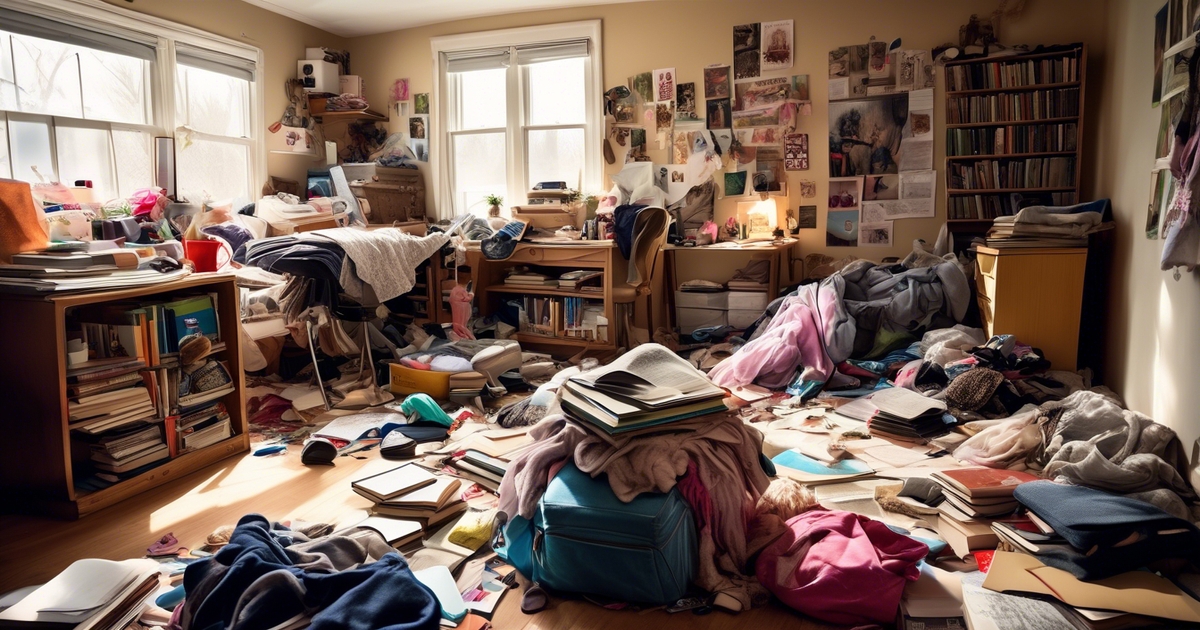Why Does My Teenage Daughter’s Room Smell? Unraveling the Mystery
Is there a mysterious odor lingering in your teenage daughter’s room? You’re not alone. Many parents are left puzzled by the persistent smell that seems to have taken up residence. From gym shoes to forgotten food containers, the culprit could be anything. But fear not, we’ve got you covered.
In this post, we’ll delve into the common reasons why your teenager’s sanctuary might be emitting less-than-pleasant aromas and provide practical solutions for freshening things up. Whether it’s tackling laundry piles or addressing hidden sources of funk, we’ll explore effective strategies to combat those stubborn scents and restore a breath of fresh air to her space.
Key Takeaways
- Proper ventilation is crucial in preventing bedroom odors. Encourage opening windows and using fans to improve air circulation.
- Regularly remind your teenage daughter to keep up with laundry to prevent the accumulation of dirty clothes, which can contribute to unpleasant smells.
- Encourage your daughter to dispose of food and beverage containers promptly to prevent lingering odors in her room.
- Educate your daughter about the impact of personal hygiene products on room odors and encourage proper storage and disposal.
- Emphasize the importance of maintaining cleanliness in her bedroom by regularly dusting, vacuuming, and decluttering.
- Consider using odor-neutralizing solutions like air fresheners, baking soda, or essential oils to combat persistent smells.
- Empower your teenage daughter to take responsibility for the cleanliness and freshness of her room by involving her in the cleaning process.
- Implement preventative measures such as using odor-absorbing products and establishing a routine for maintaining a fresh-smelling bedroom.
Unraveling the Mystery of Bedroom Odors
Unpleasant room odors in a teenager’s room can stem from various common sources. Dirty laundry left to pile up, food and drink spills that haven’t been cleaned, and sweaty sports equipment are typical culprits. The accumulation of unpleasant smells in the enclosed space is contributed by these sources.
Understanding these common sources is crucial for addressing the issue effectively. For instance, if dirty laundry is identified as a primary source of odor, implementing a regular laundry schedule can help mitigate the problem. By recognizing these common sources, parents and teenagers can work together to tackle each specific issue contributing to the room’s smell.
Teenage Habits
The impact of teenage habits on room odor cannot be overlooked. Specific behaviors such as neglecting to open windows for fresh air circulation can lead to persistent unpleasant smells in a teenager’s room. These habits directly influence the overall hygiene of their living space.
Addressing these habits involves fostering awareness about their consequences on room odor and emphasizing responsibility in maintaining cleanliness. Encouraging teenagers to adopt simple routines like opening windows daily for ventilation or tidying up after themselves can significantly improve the freshness of their rooms.
Hygiene Factors
Maintaining a fresh-smelling room for teenagers heavily relies on hygiene factors such as regular cleaning practices, proper storage of items, and sharing options. The significance of good hygiene practices should not be underestimated when combating unpleasant odors in a teenager’s room.
Highlighting how personal hygiene, including teen, also plays into this equation is essential; unwashed clothes or neglected personal grooming may contribute significantly to lingering odors within the enclosed space.
Hidden Culprits
In addition to more obvious causes, there are often hidden culprits responsible for lingering odors in a teenager’s room that go unnoticed but have significant impacts on overall smell quality. For example, mold growth due to dampness from unattended spills or leaks could be an inconspicuous yet potent contributor to persistent bad smells.
The Impact of Poor Ventilation
Airflow Issues
Poor ventilation can lead to stagnant odors in your teenage daughter’s room, sharing options. When the air doesn’t circulate properly, it allows unpleasant smells to linger and intensify. For instance, if dirty laundry piles up and the room lacks proper airflow, the musty smell from the clothes becomes more potent.
To combat this issue, encourage your daughter to open windows regularly to let fresh air in. Using a fan or an air purifier can help improve air circulation within the room. These simple steps can significantly reduce stagnant odors by allowing fresh air to replace stale air.
Mold Growth
Inadequate ventilation also contributes to mold growth, which is often accompanied by a pungent odor. If there are damp areas or water leaks in your daughter’s room due to poor ventilation, mold may thrive and cause an unpleasant smell. Furthermore, mold poses serious health risks such as allergies and respiratory issues for both you and your daughter.
To address this concern, ensure that any damp or wet areas are promptly dried out. Using a dehumidifier can also help regulate moisture levels in the room and prevent mold growth. It’s crucial to fix any sources of moisture intrusion like leaky pipes or roofs promptly.
Accumulation of Dirty Laundry
Fabric odors can significantly contribute to the unpleasant smell in your teenage daughter’s room. Dirty clothes left lying around, especially damp or sweaty items, can emit a musty and stale odor that lingers in the air. Unclean bed linens and curtains can also harbor unpleasant smells, impacting the overall freshness of the room.
Common sources of fabric odors include dirty socks, used towels, and unwashed garments piled up in closets or on the floor. These items accumulate dirt and sweat over time, leading to a buildup of unpleasant odors within the fabrics themselves. Moreover, if these soiled clothes are kept in closed spaces like drawers or hampers without proper ventilation, they are more likely to develop stubborn smells.
To effectively manage and eliminate fabric-related odors from your teenager’s room, encourage regular washing of dirty clothes and linens. Teach your daughter about separating dirty laundry from clean ones to prevent cross-contamination of odors during storage. Furthermore, ensure that her closet is well-aired by leaving its doors open occasionally to prevent trapped musty smells from permeating into other areas of her room.
Overlooked Food and Beverages
These can be major contributors to the unpleasant smell in your teenage daughter’s room. Leftover food or drinks that have been forgotten and left to decay can emit strong odors, making the room smell less than pleasant. Spillage from beverages like milk, juice, or soda can seep into carpets, bedding, or furniture, creating a lingering stench.
Decay and spillage not only lead to foul odors but also attract pests like ants, cockroaches, or rodents. These pests are drawn to the decaying matter and spilled liquids as a source of sustenance. As they forage for food in your daughter’s room, they leave behind their own odor which adds to the overall unpleasant smell.
To address decay- and spillage-related odors in your daughter’s room:
- Encourage her to clean up any leftover food or drink promptly.
- Use cleaning agents suitable for removing stains from carpets and upholstery.
- Implement regular deep cleaning sessions that target areas prone to spills.
Attracting pests is another factor contributing to unwanted smells in your teenager’s room. Factors such as leaving out open containers of snacks or improperly stored garbage cans can lure pests into the space. Once inside, these creatures leave behind droppings and urine that contribute significantly to the disagreeable odor permeating throughout the room.
Pest infestation not only causes an offensive smell but also poses health risks due to potential exposure to allergens carried by pests such as dust mites found on rodents’ fur.
To prevent pest attraction and manage associated odors:
- Advise your daughter on proper storage of snacks in sealed containers.
- Regularly empty trash cans with food remnants promptly.
- Consider using pest deterrents such as essential oils known for repelling common household pests.
Personal Hygiene Products and Their Effects
Scent Overload
Teenagers often use personal hygiene products with strong scents, such as perfumes, body sprays, and scented lotions. When these products are used excessively in a closed space like a bedroom, they can lead to scent overload. This overuse of scented products can contribute to an overpowering smell in the room. The accumulation of various fragrances can mix and create an unpleasant odor that lingers in the air.
Moreover, excessive use of scented personal hygiene products can have negative effects on air quality within the living space. Some individuals may be sensitive to strong fragrances, leading to respiratory issues or headaches when exposed to overwhelming scents for prolonged periods. To address this issue, it’s important for teenagers to understand the impact of their choices regarding personal hygiene products and strive for a balanced approach. Encouraging them to use these items sparingly or opt for lighter scents can help maintain a pleasant environment without overwhelming the senses.
Chemical Reactions
In addition to scent overload, chemical reactions from various substances present in a teenager’s room can also lead to undesirable odors. For instance, when certain cleaning agents come into contact with spills or stains on carpets or furniture, they may produce unpleasant smells as a result of chemical reactions. Items made from synthetic materials such as plastics or foams can emit odors due to off-gassing caused by chemical compounds within these materials.
Common triggers for chemical reaction-induced odors include using harsh cleaning chemicals without proper ventilation and having synthetic furnishings in close proximity. Minimizing these odors involves making informed choices about cleaning products and opting for natural alternatives whenever possible. Furthermore, ensuring adequate ventilation while using cleaning agents is crucial in preventing lingering odors caused by chemical reactions.
Managing Bedroom Cleanliness
Regular Cleaning Routine
Maintaining a fresh-smelling teenage daughter’s room requires establishing a regular cleaning routine. This habit has a positive impact on reducing unwanted odors and creating an inviting living space for your teenager. Encourage your daughter to make her bed every morning, as this simple task can instantly improve the overall cleanliness of the room. Emphasize the importance of vacuuming or sweeping the floor at least once a week to remove dust and dirt that may contribute to unpleasant smells.
Practical tips for incorporating regular cleaning habits into daily life include setting aside specific days for different tasks, such as laundry day and general tidying up day. By breaking down chores into manageable chunks, it becomes easier for teenagers to maintain cleanliness without feeling overwhelmed by the workload. Furthermore, encourage your daughter to open windows regularly to let in fresh air and sunlight, which can help eliminate musty odors and create a more pleasant environment.
Organizational Tips
Effective storage solutions play a crucial role in managing clutter and minimizing potential sources of odor in your teenage daughter’s room. Teach her how to declutter by sorting through clothes, books, and personal items regularly. Consider investing in storage bins or baskets where she can neatly stow away belongings instead of leaving them scattered around the room.
Highlighting the correlation between organization and improved air quality is essential for helping your teenager understand why keeping her room tidy matters beyond just appearances. For instance, explain how dirty laundry left lying around can emit unpleasant odors due to bacteria growth from sweat and body oils on clothing items. Encouraging her to keep bedding clean by washing sheets regularly also contributes significantly to maintaining freshness within the living space.
Odor Neutralizing Solutions
Natural Remedies
When wondering why does my teenage daughter’s room smell, natural remedies can be highly effective in combating unwanted odors. One simple and popular solution is using baking soda. It’s known for its excellent deodorizing properties and can easily absorb unpleasant smells in the air. To implement this remedy, place an open box of baking soda in the room or sprinkle it on carpets before vacuuming.
Another natural ingredient to consider is white vinegar. Its acidic nature makes it a powerful odor eliminator, especially for removing musty smells. Mix equal parts of water and white vinegar in a spray bottle and mist the solution around the room to neutralize odors effectively.
Commercial Products
Commercial products offer a wide range of options to address specific odor concerns in your teenager’s room. Air purifiers are great for continuously filtering out airborne particles that cause bad odors, such as dust, pet dander, and smoke residue. Look for models with HEPA filters as they are particularly efficient at trapping tiny particles.
For more targeted solutions, consider using odor-neutralizing sprays or gels designed specifically for eliminating teenage bedroom odors. These products come in various scents or unscented versions if you prefer no added fragrance.
When selecting commercial products, it’s important to assess individual needs based on factors like the source of the odor (e.g., dirty laundry, sports equipment) and personal preferences regarding scent intensity.
Encouraging Teen Responsibility
It’s important to stress the significance of their participation. By explaining how a clean and fresh-smelling room contributes to a healthy and pleasant environment, you can encourage them to take responsibility for maintaining cleanliness.
Offering strategies for engaging teens in maintaining cleanliness and freshness can involve setting up a weekly cleaning schedule or creating a checklist of tasks that need to be completed regularly. For example, you might suggest that they make their bed every morning, open windows for ventilation, or do laundry on designated days.
Collaborative efforts between parents and teens have numerous benefits. When teenagers feel involved in decision-making processes related to their living space, they are more likely to take ownership of the responsibilities. This collaborative approach also fosters better communication between parents and teens while instilling essential life skills related to organization and hygiene.
Involving Your Teen
- Stress the importance of involving teenagers in addressing odor issues within their living space
- Offer strategies for engaging teens in maintaining cleanliness and freshness
- Highlight benefits of collaborative efforts between parents and teens
Establishing Rules
- Provide guidance on establishing rules related to cleanliness and odor management within a teenager’s living space
- Discuss effective communication strategies when setting rules with teenagers
Preventative Measures for Future Freshness
Ventilation Strategies
Proper ventilation is crucial in combating the persistent odors that may linger in your teenage daughter’s room. By exploring effective ventilation strategies, you can significantly improve air circulation and create a fresher living space. Consider opening windows regularly to allow fresh air to enter the room and stale air to exit. Using fans or installing an air purifier can aid in keeping the air clean and odor-free. These practical methods not only help eliminate existing odors but also prevent new ones from developing.
Enhancing ventilation within your teenager’s living space has a significant impact on overall air quality. It helps reduce stuffiness and prevents the accumulation of unpleasant smells by promoting constant airflow. Proper ventilation also plays a vital role in creating a healthier environment for your daughter, as it reduces the risk of mold growth due to excessive moisture buildup.
Routine Checks
Conducting routine checks is essential for identifying potential sources of odor within your teenager’s living space. Emphasize the importance of regular inspections aimed at maintaining freshness by creating a checklist that covers all areas where odors could originate from. This proactive approach allows you to address emerging odor concerns promptly before they become overwhelming.
Summary
You’ve now uncovered the culprits behind that mysterious teenage bedroom smell. From poor ventilation to neglected laundry and forgotten food, there are various factors contributing to the unpleasant odor. You’ve also learned about effective solutions like regular cleaning, odor-neutralizing products, and encouraging your teen to take responsibility for their space.
It’s time to take charge and put these insights into action. Start by having an open conversation with your teen about the importance of a clean and fresh-smelling room. Together, implement some preventative measures and make it a team effort. With a proactive approach, you can banish the bad odors for good and create a more pleasant living environment for everyone. Now go on, tackle that smelly room and enjoy the sweet smell of success!
Frequently Asked Questions
Why does my teenage daughter’s room smell?
Teenage bedrooms can develop odors due to poor ventilation, accumulation of dirty laundry, overlooked food and beverages, and personal hygiene products. These factors contribute to the unpleasant smell in the room.
How can poor ventilation impact bedroom odors?
Poor ventilation traps odors in a confined space, leading to a stale and musty smell. Opening windows or using fans helps circulate fresh air and reduces lingering odors.
What are some odor neutralizing solutions for teenage bedrooms?
Using natural remedies like baking soda or commercial air fresheners can help neutralize unwanted smells. Regularly cleaning carpets, bedding, and upholstery also contributes to a fresher environment.
How can I encourage my teen to take responsibility for their bedroom’s cleanliness?
Engage your teen by explaining the importance of maintaining a clean space for their well-being. Establishing clear expectations and providing gentle reminders will encourage them to take ownership of their living area.
Are there preventative measures for ensuring future freshness in my daughter’s room?
Regular cleaning routines, proper storage of laundry and food items, as well as encouraging good hygiene practices among teens are effective preventive measures for maintaining a fresh-smelling bedroom.







